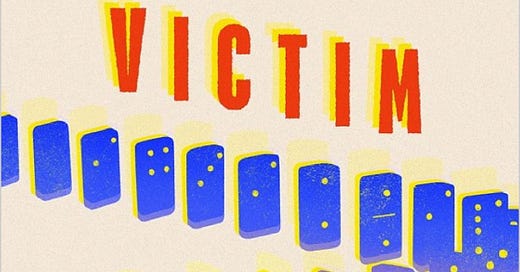Okay, so let’s say you’re a smarter-than-average kid growing up in a less-than-white-privileged neighborhood like the South Bronx. You dream of being a “famous writer” someday. But your HS guidance counselor tells you the only way this will happen is to be admitted to a prestigious university far from the ‘hood.
And the only way you can sway the admissions committee is to “play the victim” and write about your less-than-advantageous background—murdered drug dealer dad, single cash-strapped mom, best friend serving time for gang activity—in your essay.
This is the story of Javier Perez, the protagonist of “Victim,” Andrew Boryfa’s satirical, cynical and absolutely wonderful new novel. For in Javier’s eyes, he’s not a victim; or poor. “Maybe poor-ish,” as he puts it. But the admission committee buys it, and Javier is in.
Once he arrives at school Javier encounters fellow students who espouse revolutionary dogma but who actually grew up in wealthy, predominantly white suburbs. “It was in one of my very first classes,” Javi hilariously recounts, “that I learned something profound: I am a victim of systemic oppression.”
Javier joins the Latino student association and soon becomes the first Latino columnist of the school newspaper in its 100-year existence. But instead of writing his truth, he constantly stretches it, lying about various instances of victimization. Javier senses this will help him romantically with Anais, a fiery half-Hispanic student from one of those aforementioned wealthy white suburbs.
Javier and Anais eventually become a couple and after graduation, decide to move in together in NYC. Javier tests his GF’s commitment to “curing systemic injustice” by suggesting they move back to the Bronx. But Anais prefers a place in a cozy, gentrifying neighborhood where she can order lattes and avocado toast. Unsurprisingly, they break up.
Javier begins writing for local community newspapers, continuing to play the victim game and fabricate stories—one about his ex, another about his childhood friend Gio who did time in jail. Success follows but at what price?
Journalists who exaggerate or mess with the truth are nothing new: Jason Blair for the NYT and Janet Cooke for WaPo are two individuals who come to mind. In “Victim,” however Javier comes across as a victim himself—of well-meaning but clueless professors who want to applaud themselves for helping a “minority,” and editors overly eager to tick the diversity box in order to build readership.
Boryga’s tone is blunt, conversational and intentionally hilarious. He’s written for NYT and the New Yorker and “Victim” is his first novel. I wish him great success and have no doubt he will achieve it. Truth.
Like this review? Follow me at “What Does Aug Think?” at acsntn.substack.com. Thank you!




Reminds me a little of American Fiction? I may be wrong. Still the story sounds intriguing.